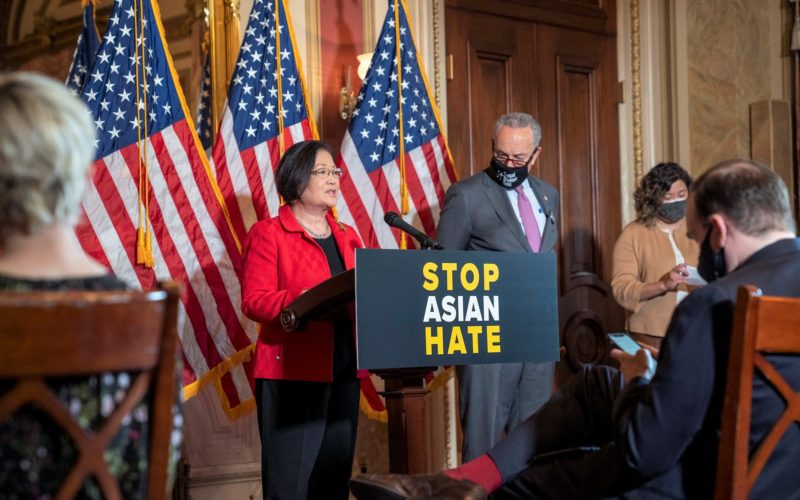Sign up here to receive The Yappie‘s weekly briefing on Asian American + Pacific Islander politics and support our work by making a donation.
The Senate overwhelmingly passed an expanded version of the COVID-19 Hate Crimes Act on Thursday, greenlighting a bill designed to address the rise in violence against Asian Americans and Pacific Islanders (AAPI). It’s a rare bipartisan act that moves the legislation one step closer to the president’s desk—a “long overdue bill,” the Senate majority leader said from the floor.
The modest measure, sponsored by Sen. Mazie Hirono (D-Hawaii), has the Biden administration’s support and is likely to become law if the House passes its counterpart, authored by Rep. Grace Meng (D-New York). It follows a yearlong spike in anti-Asian hate crimes, the worst of which have involved stabbings, physical disfigurement, and deadly assaults. The rise in incidents has also hurt Asian Americans’ mental wellbeing—most Asian adults say reports of anti-Asian hate impact their mental health.
The COVID-19 Hate Crimes Act seeks to strengthen the U.S. Department of Justice's ability to track discrimination and violence against AAPIs by assigning a point person at the agency to expedite the review of coronavirus-related hate crimes. It also bolsters support for state and local law enforcement agencies responding to hate incidents, and makes hate crimes information more accessible to AAPI communities.
Sen. Josh Hawley (R-Missouri) was the lone dissent in the 94-1 vote; he told CNN earlier this week he was concerned that the bill is “hugely broad, hugely open-ended“ and “mandates all this data collection … that the federal government will collect and maintain."
The bill cleared the upper chamber after Senate leaders reached a deal to vote on three Republican amendments to the bill, each requiring 60 votes for passage. On Wednesday, Hirono announced that she had also reached an agreement with Sen. Susan Collins (R-Maine) to modify the legislative language “while retaining the bill’s core purpose to combat anti-Asian hate.“
“We will send a powerful message of solidarity to the AAPI community that the Senate will not be a bystander as anti-Asian violence surges in our country,” Hirono said Thursday.
The House passed a resolution introduced by Meng to denounce anti-Asian sentiment last year, but the COVID-19 Hate Crimes Act marks Congress’ first substantial legislative effort to address rising anti-Asian hate since the start of the pandemic.
Some activists, however, have warned that such legislation could have adverse effects, especially when it centers law enforcement. “It has been proven time and time again that police response to violence in marginalized communities and police ‘intervention’ in marginalized communities is not an effective mode of ‘curbing the violence’ that is occurring in that community,” a sex worker and organizer with grassroots collective Red Canary Song, told Refinery29. “And in actuality, the police force is the one that is instigating a lot of the violence that they claim to be curbing.”
Lawmakers say the bill is an urgent and necessary first step, adding that it will ensure federal agencies work with community organizers. “As far as I’m concerned, the focus is on the victims, not on the perpetrators,” Hirono said in an interview with The Cut. “It doesn’t amend any existing laws; these incidents can already be prosecuted. The purpose of this bill is to collect data. It’s reporting-focused, so we can gauge the depth and extent of these kinds of attacks.”
The bill’s passage comes one day after the Senate moved to confirm Vanita Gupta as associate attorney general, making her the highest-ranking Asian American in Justice Department history. Gupta previously served as president and CEO of the Leadership Conference on Civil and Human Rights, a coalition that includes many leading AAPI advocacy groups.
The House Judiciary Committee was scheduled to mark up its version of the COVID-19 Hate Crimes Act on Wednesday, but paused work to monitor action in the Senate, which previewed its bipartisan approach last week when it voted 92-6 to advance the legislation to floor debate.
“We’re seeing that when the Senate is given the opportunity to work, the Senate can work,” Senate Majority Leader Chuck Schumer (D-N.Y.) said in session Monday. “Members from both sides of the aisle have worked together over the past week to consider, perfect, and—soon—enact legislation responding to a pressing issue.”
Collins worked with Hirono to make an explicit reference to Asian Americans in the bill, while Sens. Richard Blumenthal (D-Conn.) and Jerry Moran (R-Kan.) incorporated Sen. Rick Scott’s (R-Fla.) feedback into their legislation—the “No Hate Act”—which addresses hate crimes at large and is now an amendment to Hirono’s bill.
Sen. Raphael Warnock (D-Ga.) also helped Collins and Hirono include language to acknowledge the Atlanta shootings, which killed eight people including six Asian women.
“We hear about the violent acts. We heard about the deaths. But every day thousands—thousands—of Asian Americans are subject to smaller but nonetheless stinging acts of hate crimes by being called names, by being spat upon, by being cursed at and even just by being stared at in a nasty way,” Schumer added in his remarks Monday.
“So we must act,” Schumer said, citing the need to strengthen the Department of Justice's ability to prosecute hate crimes, detection of hate crimes, and accurate data on anti-Asian hate.
“To our Asian-American friends, a great 6% of America … you are us. We are all Americans together, and we welcome you being here,” Schumer said.
“Second, a message to those who perpetrate these awful acts: you are not America. We despise what you do and we're going to remain vigilant until this kind of bigotry is diminished and maybe even snuffed out.”









